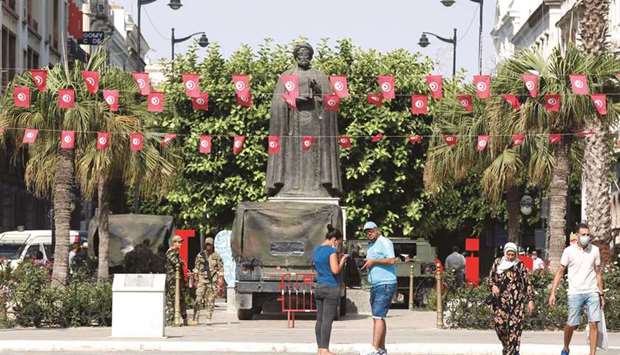Tunisia lurched further into political uncertainty yesterday, as President Kais Saied sacked more officials, days after he suspended parliament and assumed executive powers in what opponents labelled a “coup”.
Key civil society groups warned against any “illegitimate” extension of Saied’s 30-day suspension of parliament, and demanded in a joint statement a timeline for political action. After suspending parliament and sacking Prime Minister Hichem Mechichi on Sunday, and firing the defence and justice ministers on Monday, Saied then ordered the dismissal of several top officials.
Late Tuesday, 63-year-old Saied, a former law lecturer who was a political newcomer when he won a landslide 2019 presidential election victory, issued decrees sacking a long list of senior government officials, including the army’s chief prosecutor.
He has also lifted the parliamentary immunity of lawmakers, and assumed judicial powers. Saied say his actions are justified under the constitution, which allows the head of state to take unspecified exceptional measures in the event of an “imminent threat”.
On top of the political turmoil, the North African nation is beset by a crippling economic crisis including soaring inflation and high unemployment, as well as surging Covid-19 infections.
The moderate Islamist Ennahdha party, which was the largest faction in the coalition government, has labelled the power grab a “coup d’etat”, while the US, EU and other powers have voiced strong concern.
FRENCH APPEAL
French Foreign Minister Jean-Yves Le Drian yesterday urged Tunisia to rapidly appoint a new prime minister and government.
Further ramping up tensions, the Tunisian prosecutor’s office announced yesterday the judiciary has opened an investigation into allegations that Ennahdha and two other political parties received illegal funding ahead of elections in 2019.
The financial arm of the judiciary opened the probe on July 14, focusing on “the foreign financing and acceptance of funds of unknown origin,” prosecution spokesman Mohsen Dali said. Tunisians are waiting anxiously for clarity on the next political steps. Saied, an austere law academic who has said he is determined to revolutionise the political system through the law, said he would assume executive power “with the help” of a government whose new chief he would appoint himself.
Names of possible candidates circulated yesterday after Saied met with representatives of national organisations late Monday. “President Saied will be very careful in choosing the future head of government, because he wants a trustworthy and loyal person who would adopt the same policies as him,” said political scientist Slaheddine Jourchi.
The young democracy had often been cited as the sole success story of the Arab Spring.
But, a decade on, many in the nation of 12mn people say they have seen little improvement in living standards, and have grown infuriated by protracted political deadlock with infighting among the elite. The ousted government had also been criticised for its handling of the Covid pandemic.
Tunisia has one of the world’s highest official per-capita death tolls.
“President Saied is faced with a great challenge: to show Tunisians and the world that he made the right decisions,” added Jourchi.
After violent clashes outside the army-blockaded parliament on Monday, the Ennahdha party said “organised thugs” were being used to “provoke bloodshed and chaos”. On Tuesday Ennahdha said that, “for the sake of the democratic path,” it is “ready to go to early legislative and presidential elections” while demanding “that any delay is not used as a pretext to maintain an autocratic regime.”

People walk in the centre of Tunis, yesterday.
